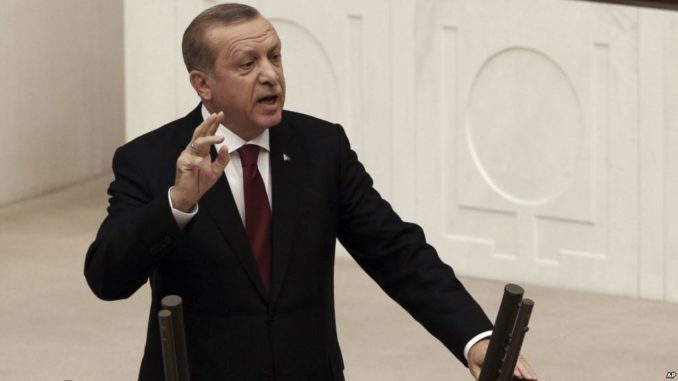
DIYARBAKIR, Turkey (Reuters) – Turkish authorities arrested the leaders of the country’s main pro-Kurdish opposition party in a terrorism investigation on Friday, drawing strong international condemnation of a widening crackdown on dissent under President Tayyip Erdogan.
Selahattin Demirtas and Figen Yuksekdag, co-leaders of the Peoples’ Democratic Party (HDP), were jailed pending trial after being held in overnight raids, officials said. Ten other HDP lawmakers were also detained, although some were later released.
The arrest of elected members of the Turkish parliament’s third largest party, and the detention or suspension of more than 110,000 officials since a failed coup in July, may “go beyond what is permissible”, the U.N. human rights office said.
The United States expressed deep concern, while Germany and Denmark summoned Turkish diplomats over the Kurdish detentions, and European Parliament President Martin Schulz said the actions “call into question the basis for the sustainable relationship between the EU and Turkey”.
Turkish Prime Minister Binali Yildirim told reporters: “Turkey is a nation of laws, nobody has preferential treatment before the law … What has been done is within the rule of law.”
The HDP lawmakers were arrested after they refused to give testimony in a probe linked to “terrorist propaganda”, Yildirim said, adding: “Politics can’t be a shield for committing crimes”.
Hours after the detentions, a car bomb killed nine people and wounded more than 100 near a police station in the southeastern city of Diyarbakir where some of the lawmakers were being held.
The HDP, which made history last year by becoming the first Kurdish party to win 10 percent of the vote and enter parliament, said the detentions risked triggering civil war.
In a video message on a website close to the Kurdish PKK militants, one of the group’s top commanders, Murat Karayilan, said the group would intensify its three-decade-old armed struggle against Turkey and called on Kurds – the country’s largest minority – to react.
Islamic State jihadists later claimed responsibility for the attack in Diyarbakir, according to the militant group’s Amaq news agency.
Islamic State leader Abu Bakr al-Baghdadi in a speech released on Thursday had called for attacks on Turkey, saying it had sided with the enemy, with Turkish troops fighting them in Syria.
SOCIAL MEDIA BLOCKED
Access was restricted to social media including Twitter, WhatsApp, YouTube and Facebook – making them so slow they were effectively impossible to use – and a ban imposed on media coverage of the car bomb. Asked about the measures, Yildirim said access would return to normal “once the danger is removed”.
U.S. State Department spokesman John Kirby said: “The United States is deeply concerned by the Turkish government’s detentions of opposition members of parliament … and by government restrictions on Internet access today.”
He also condemned Friday’s bombing and urged the PKK to “cease its senseless brutal attacks”.
The arrests of elected lawmakers from the HDP, which won more than five million votes at the last general election, heightened concern among Western allies about the political direction of Turkey, a NATO member and a buffer between Europe and the conflicts raging in Syria and Iraq.
European Union foreign policy chief Federica Mogherini said she was “extremely worried” by the arrests, and raised her concerns in a telephone call with Turkey’s foreign and EU affairs ministers late on Friday.
German Foreign Minister Frank-Walter Steinmeier said Ankara had a right to fight terrorism, but could not use it to justify gagging opponents.
Turkish Foreign Minister Mevlut Cavusoglu accused EU member states of supporting the PKK and dismissed the bloc’s criticism as “unacceptable”. Turkey began negotiations to join the EU in 2005, but has made glacial progress, and there is no prospect of it joining anytime soon.
CURRENCY FALLS
Southeastern Turkey has been rocked by political turmoil and violence for more than a year after the collapse of a ceasefire with the PKK, deemed a terrorist organisation by the United States and European Union as well as Turkey.
Erdogan and the ruling AK Party accuse the HDP of links to the PKK. The HDP denies direct links and says it is working for a peaceful resolution of the Kurdish conflict.
After the arrests, the Turkish lira currency TRYTOM=D3 hit fresh record lows against the dollar, while the cost of insuring Turkish government debt against default hit its highest in over a month.
In a statement on Twitter, still accessible in Turkey through virtual private networks, the HDP called for the international community “to react against the Erdogan regime’s coup”, while party spokesman Ayhan Bilgen described the detentions as an attempt to provoke a civil war.
“I will not hesitate to be held accountable in front of a fair and impartial judiciary. There is nothing I cannot answer for,” the arrested Demirtas said in a statement to the prosecutor, which was shared by HDP lawmaker Besime Konca.
“But I refuse to be an actor in this judicial theatre just because it was ordered by Erdogan, whose own political past is suspicious”, he said.
Police also raided and searched the party’s head office in central Ankara. Police cars and armed vehicles had closed the entrances to the street of the HDP headquarters.
A group of protesters chanting slogans tried to reach the party offices, but were stopped by police before they could enter the street, a Reuters witness said.
The HDP is the third-largest party in the 550-seat Turkish parliament, with 59 seats. Parliamentarians in Turkey normally enjoy immunity from prosecution, but the immunity of many lawmakers, including HDP deputies, was lifted earlier this year.
(Reporting by Ece Toksabay, Ayla Jean Yackley, Humeyra Pamuk, Daren Butler, Tuvan Gumrukcu, Gulsen Solaker, Can Sezer, Birsen Altayli, Orhan Coskun, Ercan Gurses, Tulay Karadeniz and David Dolan; Alastair Macdonald and Alissa de Carbonnel in Brussels, Tom Miles in Geneva, David Alexander in Washington, Noah Barkin and Andrea Shalal in Berlin, writing by Nick Tattersall; editing by Peter Graff, Mark Trevelyan and G Crosse)
